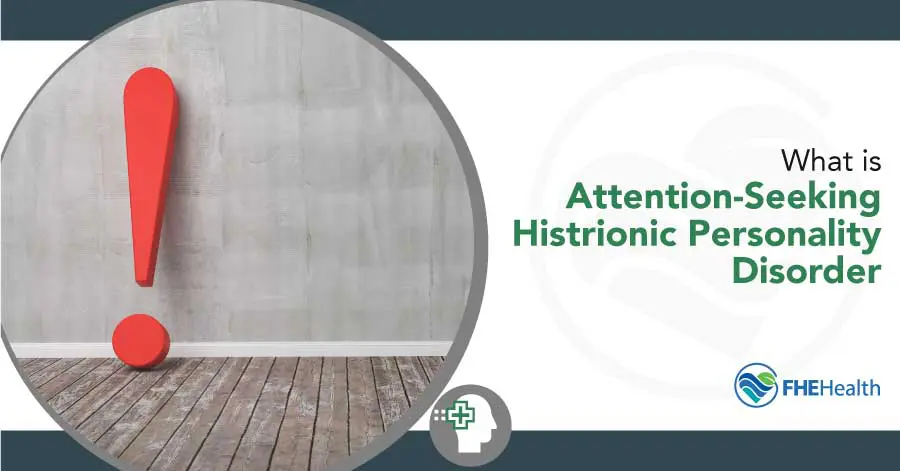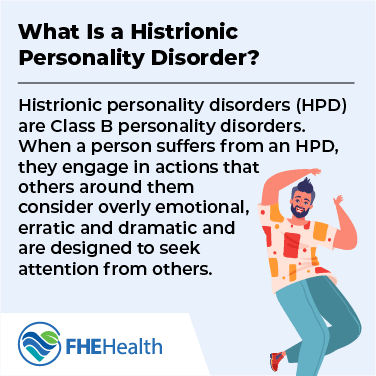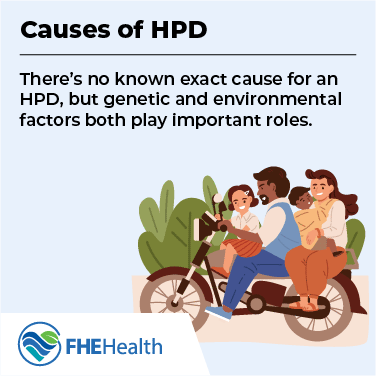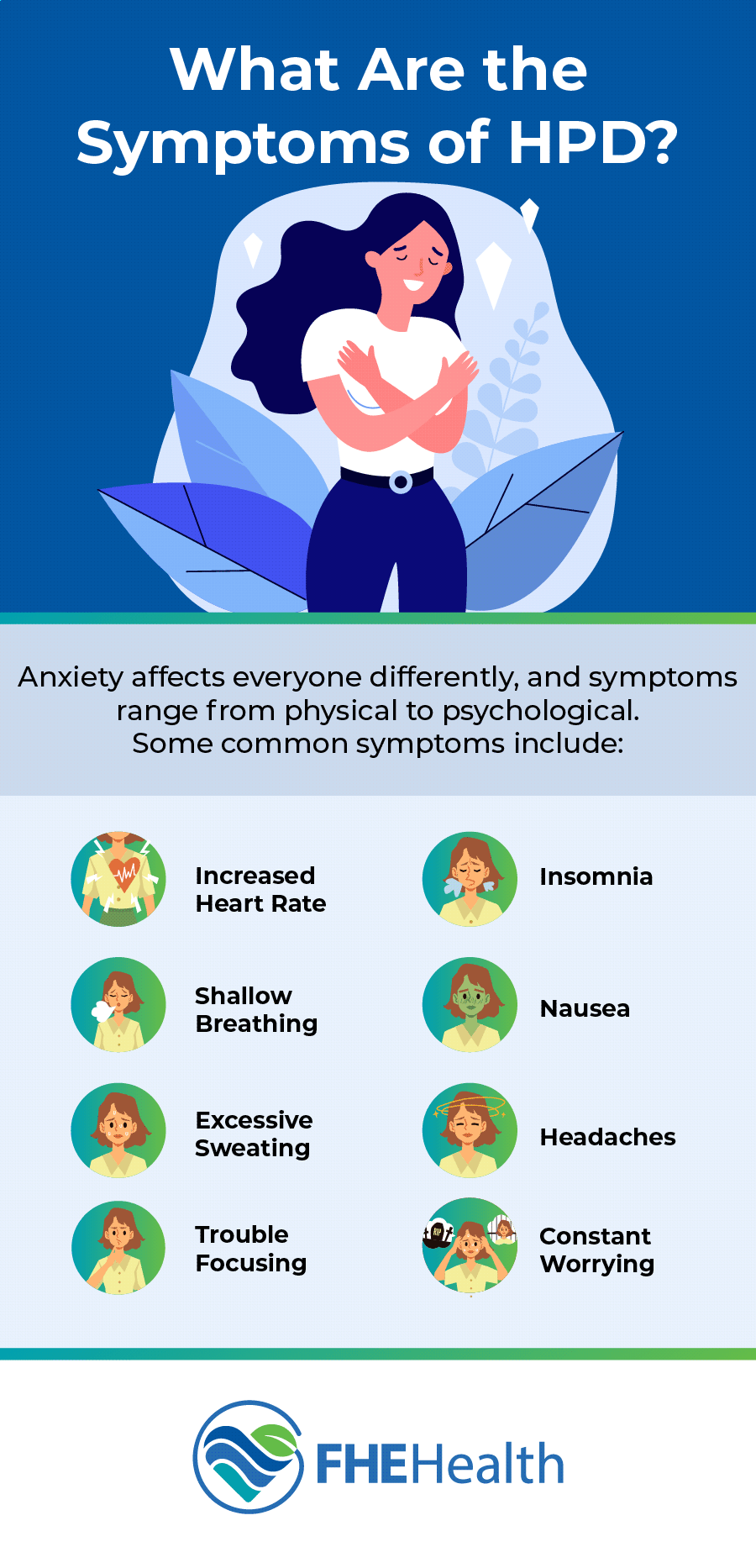
When an individual suffers from histrionic personality disorder (HPD), they base their sense of self-worth on the approval of others to an extreme degree. This often results in behavior where the individual acts in an overly dramatic, exaggerated, or inappropriate manner to gain attention.
What Is a Histrionic Personality Disorder?
 Histrionic personality disorders (HPD) are Class B personality disorders. When a person suffers from an HPD, they engage in actions that others around them consider overly emotional, erratic, and dramatic and designed to seek attention from others. Some individuals medical experts believe had an HPD include actresses Anna Nicole Smith and Marilyn Monroe, as well as former football coach and convicted sex offender Jerry Sandusky.
Histrionic personality disorders (HPD) are Class B personality disorders. When a person suffers from an HPD, they engage in actions that others around them consider overly emotional, erratic, and dramatic and designed to seek attention from others. Some individuals medical experts believe had an HPD include actresses Anna Nicole Smith and Marilyn Monroe, as well as former football coach and convicted sex offender Jerry Sandusky.
More women than men are known to suffer from this disorder, which is often observable as early as young adulthood.
Causes of HPD
Medical experts acknowledge there’s no known exact cause for HPD, but they believe genetic and environmental factors both play important roles. If HPD is known to run in several generations of a family, a genetic susceptibility may exist among its members. It’s also possible, however, that a child of an HPD adult who begins to exhibit the same symptoms may be simply repeating behavior learned from their mother or father.
 Environmental factors may include a lack of punishment or criticism for any kind of bad behavior, unusual attention paid to a child the parents don’t understand, or attention and praise only given for particular behaviors. The result of these actions is that the child is uncertain of the right way to behave and what actions will earn the genuine approval of their parents. In adulthood, this leads to often erratic and overly dramatic behaviors designed to generate attention because the individual isn’t sure of the appropriate way to gain approval from their peers.
Environmental factors may include a lack of punishment or criticism for any kind of bad behavior, unusual attention paid to a child the parents don’t understand, or attention and praise only given for particular behaviors. The result of these actions is that the child is uncertain of the right way to behave and what actions will earn the genuine approval of their parents. In adulthood, this leads to often erratic and overly dramatic behaviors designed to generate attention because the individual isn’t sure of the appropriate way to gain approval from their peers.
The problem for someone with a histrionic personality is that these behaviors usually alienate their family, friends, or loved ones. The need for constant reassurance and inability to deal with anyone near them receiving more attention than them undermines many relationships.
How Common Is Histrionic Personality Disorder?
Although HPD is far from the most common of the personality disorders known to medicine (a landmark survey done in 2004 estimated that 1.8% of the adult population in America suffered from HPD), it can still be debilitating and life-crushing for those who suffer from it.
What Are the Symptoms of HPD?
 The many symptoms of HPD are oriented to generate more attention for the individual suffering from HPD. Some of the symptoms include:
The many symptoms of HPD are oriented to generate more attention for the individual suffering from HPD. Some of the symptoms include:
- Experiencing emotions that shift rapidly from one extreme to the other
- Constantly seeking reassurance for things they’ve done
- Being extremely concerned about their appearance
- Being overly sensitive to criticism, even when justified and delivered in a non-threatening way
- Constantly acting in a dramatic fashion that seems more like a performance than anything else
- Being easily influenced by others, which results in constantly shifting decisions
- Not being comfortable in any situation unless they’re the center of attention
- Being easily bored by routine
- Beginning a project but then dropping it when it requires attention or effort
- Having a low tolerance for frustration
Dr. Beau A. Nelson, DBH, LCSW, FHE Health’s Chief Clinical Officer points out that “histrionic relationship cycle issues with flare ups and intense emotional outbursts can create friction with the support systems of the patient needing support and help. Lashing out or having a negative emotional reaction can push people away and this often makes loneliness and desperation increase, it is a vicious cycle.”
How Is It Typically Diagnosed?
Confronting someone with histrionic personality disorder can be difficult. If the individual agrees to be tested for HPD, doctors will first perform a complete physical examination that includes a thorough look at the individual’s medical history. No lab test can detect HPD, but doctors can use a series of tests to determine if HPD is the result of a medical issue.
If all the medical tests produce a negative result, the doctor will then recommend the individual seek consultation with a psychiatrist or psychologist. This is probably the best approach to dealing with HPD, as these mental health care professionals have the assessment tools designed to detect HPD.
What Should You Do If You Think You Have HPD?
It’s often difficult for a person suffering from HPD to admit it. The key to discovering if you have HPD is to consider your social and romantic relationships. Look for evidence of a histrionic relationship cycle. A person with HPD will often sabotage friendships, marriages, or other relationships because of their need for constant attention or constant reassurance from their friends or partners.
This often leads to severe depression or anxiety when the individual with HPD wonders why they can’t form any solid relationships. If you find yourself constantly ping-ponging from one friendship or relationship to another, which leads to depressive episodes, you should consider speaking to a mental health professional.
How Is HPD Treated?
The best way to treat HPD is with the help of a psychologist or psychotherapist. As noted above, it’s difficult for individuals suffering from HPD to admit they need help. And once they do, it can be difficult for them to follow routine treatment or attend regular appointments because they find routine boring and frustrating.
However, once they’ve made that leap, mental health professionals can help them deal with their diagnosis. The psychologist or psychotherapist can help them uncover the circumstances that led to their having HPD and encourage them to engage in more positive behaviors. If appropriate, these mental health professionals can use medication to help individuals deal with depression and anxiety.
Can Histrionic Personality Disorder Be Prevented?
Because the specific cause of histrionic personality disorder is unknown but believed to be, in large part, genetic, there’s no way to prevent the condition. But the earlier it’s diagnosed, the more effectively it can be treated, which is why mental health screenings are so critical for anyone dealing with symptoms of histrionic personality disorder or another mental health condition.
What Are the Possible Complications of Histrionic Personality Disorder?
Histrionic personality disorder can cause a variety of symptoms that interfere with everyday life. It can also put you at higher risk for other mental disorders, such as depression, alcoholism and drug addiction.
Other mental disorders that are more common in people with diagnosed HPD disorder include:
- Conversion disorders. A conversion disorder occurs when you lose the functionality of some or all of your nervous system despite no physical or structural damage. It’s believed to be psychosomatic but can manifest as a physical disorder.
- Panic disorder. A panic disorder involves an acute fight-or-flight response to a non-threatening or only mildly threatening situation.
- Somatic symptom disorders. A somatic symptom disorder happens when you focus obsessively on minor physical ailments or symptoms to the point that it interferes with your daily living activities.
A person with histrionic personality disorder is also more likely to have suicidal thoughts or fantasies.
What Is the Prognosis for Histrionic Personality Disorder?
Although no permanent cure for histrionic personality disorder exists at this time, the condition can be managed with medication and therapy. Patients who seek help for histrionic personality receive an effective treatment plan and follow it as prescribed and can live happy and productive lives.
If you’re worried about your inability to form solid relationships with other people or your behavior feels out of control and you think you may be confronting a real mental illness, we can help you. Reaching out for help is the first step on your journey to recovery. You can contact us 24-7. We have a team of compassionate counselors standing by to talk with you and help you take the next steps toward your recovery.
If someone you love is dealing with the effects of HPD or another mental health challenge, help is available through our compassionate and skilled professionals. Contact us to speak to a team member now.






